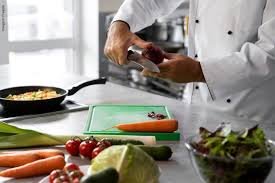Culinary medicine: experience report of an elective course for medical students
DOI:
https://doi.org/10.61661/congresso.cbmev.7.2024.122Keywords:
healthy eating, lifestylemedicine, culinary, Medical Students, Educational ActivitiesAbstract
Introduction: The global increase in unhealthy eating is closely linked to a downward trend in food preparation at home. There are studies showing a positive association between increased cooking skills and reduced cardiovascular risk. In addition, the little time devoted to nutrition education in the curriculum of medical schools’ contrasts with the high mortality rates attributable to poor diet. Culinary Medicine (CM) is an emerging field of Medicine, which brings a new educational approach, based on scientific evidence, whose objective is to teach the power that food has on health and to improve the eating behaviors of healthcare professionals and, consequently, of their patients. Methodology: This is an experience report of an elective discipline of CM which was developed at UNIFESP, which resulted in a descriptive study with a qualitative approach, carried out with 18 students who participated in weekly meetings during 5 weeks of training. The meetings were carried out 100% online, through the Zoom platform. Data from this study were collected through portfolios, with some description of the experience by the students. The analysis of the material was carried out through thematic analysis. A questionnaire was applied to evaluate the Culinary Skills Index developed and validated according to self-efficacy in the performance of culinary skills and having as theoretical reference, the Dietary Guideline for the Brazilian Population. Results: There are numerous challenges such as the physicians’ awareness about the importance of this approach, which often seems to be more practical than technical, and the subjectivity of the topic on changing the behavior of physicians and patients. However, the results of this study show that the students who took the elective course believe that this curricular reformulation is extremely important and urgent. Conclusion: There is a worldwide transformation trend in the curriculum of healthcare professionals, and it is believed that this process can be initiated in medical schools through elective courses in Culinary Medicine, such as the one implemented at UNIFESP.
References
Monsivais P, Aggarwal A, Drewnowski A. Time spent on home food preparation and indicators of healthy eating. Am J Prev Med. 2014;47(6):796-802. https://doi.org/10.1016/j.amepre.2014.07.033 DOI: https://doi.org/10.1016/j.amepre.2014.07.033
Aspry KE, Van Horn L, Carson JAS, Wylie-Rosett J, Kushner RF, Lichtenstein AH, et al. Medical nutrition education, training, and competencies to advance guideline-based diet counseling by physicians: a science advisory from the American Heart Association.
Circulation. 2018;137(23):e821-41. https://doi.org/10.1161/CIR.0000000000000563 DOI: https://doi.org/10.1161/CIR.0000000000000563
Leggett LK, Ahmed K, Vanier C, Sadik A. A suggested strategy to integrate an elective on clinical nutrition with culinary medicine. Med Sci Educ.2021;31(5):1591-
https://doi.org/10.1007/s40670-021-01346-3 DOI: https://doi.org/10.1007/s40670-021-01346-3
Parks K, Polak R. Culinary medicine: paving the way to health through our forks. Am J Lifestyle Med. 2020;14(1):51-3. https://doi.org/10.1177/1559827619871922 DOI: https://doi.org/10.1177/1559827619871922
La Puma J. What is culinary medicine and what does it do? Popul Health Manag. 2016;19(1):1-3. https://doi.org/10.1089/pop.2015.0003 DOI: https://doi.org/10.1089/pop.2015.0003
Martins CA, Baraldi LG, Scagliusi FB, Villar BS, Monteiro CA. Índice de Habilidades culinárias: desenvolvimento e avaliação de confiabilidade. Rev Nutr. 2019;32:e180124. https://doi.org/10.1590/1678-9865201932e180124 DOI: https://doi.org/10.1590/1678-9865201932e180124
Brasil. Guia alimentar para a população brasileira. 2a ed. Brasília: Ministério da Saúde; 2014. 156 p.

Downloads
Published
How to Cite
Issue
Section
License
Copyright (c) 2024 Marina de Andrade Maia Galvão Bueno, Juliana Aiko Watanabe, Adriana Katekawa, Marcela Rassi da Cruz, Tassiane Alvarenga, Ghina Katharine Eugenia Dourado Meira Machado, Samira Yarak, Daniel Martinez, Paula Pires Nascimento, Nicole Tanenbaum Szajubok, Caroline Ahrens

This work is licensed under a Creative Commons Attribution 4.0 International License.
The VI Brazilian Congress of Lifestyle Medicine allows the author(s) to maintain their copyright without restrictions. Publications are licensed under the Creative Commons Attribution 4.0 International License - CC-BY


